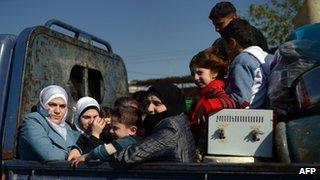Syrian atrocities 'overshadow' progress in Middle East - UK report
- Published

The UK wants the Syrian government to be referred to the International Criminal Court
There have been "positive developments" on human rights and democracy in the Middle East despite the worsening situation in Syria, the UK has said.
The Foreign Office said "terrible atrocities" continued in Syria and the UK was working to ensure all those responsible were brought to justice.
But it said progress had been made in Egypt, Libya, Morocco and Jordan.
The UK has cited 27 countries whose human rights records are a cause of concern - one fewer than last year.
The Foreign Office has removed Chad from its "watch" list - published as part of its Annual Human Rights and Democracy Repor, externalt - but China, Iran, North Korea, Iraq, Afghanistan, Cuba and Burma are among those that remain.
The UK has said there can be "no impunity" for those committing human rights abuses in Syria, where, according to United Nations estimates, some 70,000 people have died since 2011 and 1.3 million have fled the country.
The government of President Assad has said terrorist groups are responsible for much of the bloodshed, while human rights groups have accused the authorities of targeting civilians.
'Gathering evidence'
Foreign Secretary William Hague said the blame for the escalating violence "lies on the shoulders" of the Assad government and the UK was ensuring human rights abuses were recorded and pressing for action at an international level.
"We continue to see terrible atrocities committed against civilians," he said. "The UK has been at the forefront of the work of the UN Human Rights Council on Syria and... we are working to ensure that all perpetrators will be held accountable.
"In April we sent a team to the region to gather evidence and provide training to Syrian activists to document human rights violations. This will provide a basis of information that can be used for future accountability processes."
Speaking later in the House of Commons, Mr Hague expressed concerns that international humanitarian efforts in Syria were under-resourced and said the amount of support the UK was giving to opposition groups could not remain "static in the face of this growing calamity".
While he believed the National Coalition for Syrian Revolutionary and Opposition Forces - recognised by the UK as the legitimate voice of the Syrian people - was "sincere in their commitment to democracy and human rights", he said there were also extremist groups operating in the country.
Elsewhere in the Middle East, efforts to secure political and economic reform in the wake of the Arab Spring were making progress, the UK said in the report.
The first ever democratic presidential election in Egypt, elections in Libya, Tunisia and Jordan and a new constitution in Morocco were evidence that "much has already been achieved" although lasting political and economic transformation would be a "long-term process".
The report also noted that the situation in war-torn Somalia had "improved considerably" over the past year, while the conviction of former Liberian leader Charles Taylor for aiding and abetting war crimes during the Sierra Leone civil war was a "landmark for international justice".
Despite recent "positive developments" in Burma - including the release of political prisoners and an outline peace agreement with Karen rebels - the UK said there were "ongoing challenges", particularly the conflict in Rakhine state, where 100,000 people have been displaced.
'Fork in the road'
Ahead of the report's publication, Deputy Prime Minister Nick Clegg warned about the rise of "authoritarian capitalist" states that sought to render political freedoms subservient to economic success.
Writing in the Guardian, external newspaper, he suggested the strength and influence of China was a "seductive" challenge to the model of liberal democracy supported by the UK at a time that many countries - in the Middle East and elsewhere - were at a "fork in the road" over their future direction.
Economic freedoms and political rights were "mutually reinforcing", Mr Clegg added, and while the UK would inevitably have to trade with countries that did not share its values, it "should never be silent over human rights abuses to curry favour with those in power".
Earlier this year, the UK called for a new emphasis on building justice and human rights alliances with countries in the fight against terrorism, which, Mr Clegg said, would make it easier to share information about terror plots with other nations.
For Labour, shadow foreign secretary Douglas Alexander commended the UK's lead role in international efforts to end sexual violence in conflict. But he urged Mr Hague to do more to engage Russia, a historic ally of the Assad government, to help bring about an end to the violence in Syria.
- Published12 April 2013
- Published14 February 2013
- Published17 July 2012
- Published15 September 2010